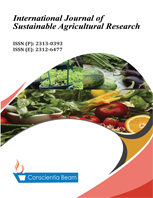Roles of Extension Services in Adoption of Agroforestry Practices among Farmers in South West Nigeria
DOI:
https://doi.org/10.18488/journal.70.2019.61.1.7Abstract
The study examined the roles of extension in the adoption of agroforestry practices in South west Nigeria, with a view to providing data on the practices of agroforestry in the area. It highlighted the extent of agroforestry, the ownership and management of agroforestry practices, the utilization and sustainability of the practices, as well as the challenges faced by farmers practicing agroforestry. Multi-stage sampling technique was used to select 200 agroforestry farmers. A large proportion (82%) of the respondents are married and the mean age was 52years. Majority (81.5%) of them had formal education while 92% are involved in farming as their primary occupation. 39.5% of the respondents are involved in the practice of shelter belt and wind breaks, 35% are involved in improved fallow, 24% in Taungya, 22% in fuel wood production, 16% in the practice of Alley cropping, 10% in Tree on range land, while 7% and 2.5% are into home garden and apiculture respectively. About half (54.5%) of respondents had no contact with extension services, access to extension service in the study area as rated by farmers is an indication of low extension agent to farmer ratio. The result of Pearson moment correlation coefficient showed that there was no significant relationship between extension contacts and sustainable adoption of agroforestry practices (r = 0.12, p = 0.07).

